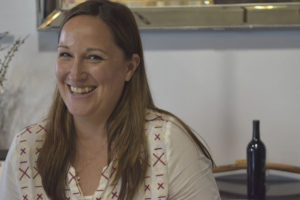Jody Elsom grew up in Woodinville, but is quick to point out that at the time, Woodinville was not wine country at all. “It was farmland and horses.” Her interest in wine started when she took a job with a company based in Sonoma and Napa. “I got to harvest and bottle. One day we sat on the porch overlooking the fields drinking wine we had bottled, and I thought “Yeah, I could live with this.’” She admitted, “I was working with more of a wine club perspective.” She had learned the people side of winemaking, the hustling, marketing, connecting, but sitting on that porch with the sun setting and great wine in her hand, she wanted to learn the science. She went to Washington State University.
After graduation, Elsom formed a cooperative with friends, bottling at home, and sharing equipment. “Wine is not a quick-and-easy industry.” Imagine combining the shifting sands and subjective standards of quality with the uncertainties of agriculture. Elsom’s focus is red wine, and Malbec is her favorite. “One of the first grapes that caught my attention was Malbec.” Perfecting full-bodied reds isn’t easy, but Elsom loves the challenge. One way to reduce those variables is to have a great partner in enology, and that’s where Rebecca Weber comes in.
Weber has a background in chemical engineering, and moved into the wine industry after working in water quality. She graduated from the University of Nevada in Reno and traveled all over the world to learn about different winemaking techniques and to discover new wines that aren’t readily available in the U.S. “I chose wineries for what I wanted to learn from them.” Her travels took her to Europe, Australia, Argentina—the great wine-growing places of the world. “I like the balance between the lab and the cellar.” As with many people in the wine industry, Weber found the combination of lab science, hands-on vineyard work and bottling, and the creative process of tasting and perfecting wine a great balance for her. “It’s great to have something to show for your work at the end of the day.” Elsom and Weber work quietly with a group of women winemakers at all ability levels from all of the state. They gather once a month for tastings, critiques, to give each other advice, and to enjoy the community that wine creates. They are currently seeking nonprofit status so they can raise money for women who want to go into viticulture and enology. “I think it’s unique of women as to how we support one another and share experiences.”





